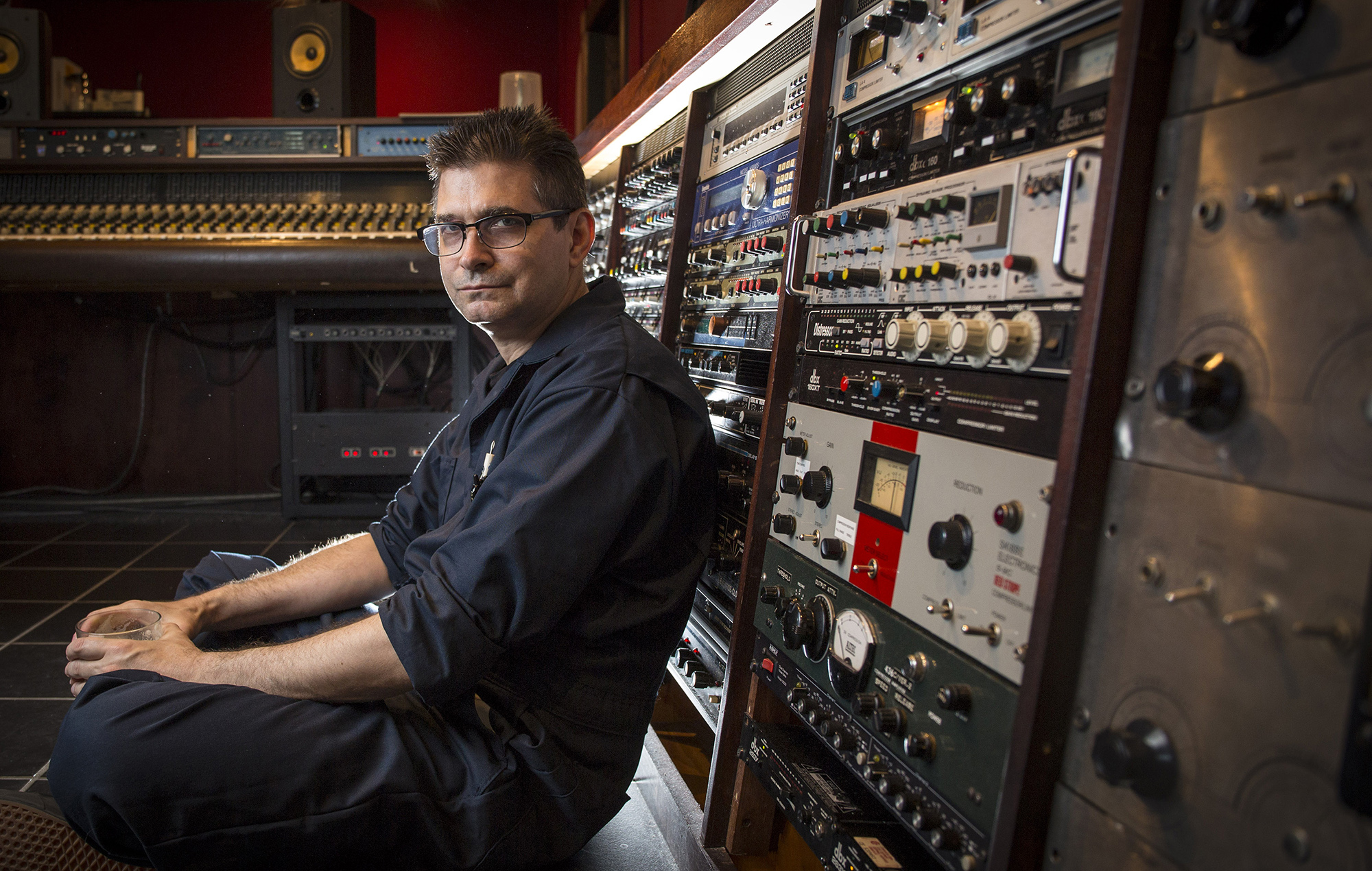Steve Albini, the iconic record engineer and underground hero, has died aged 61. In 2018, as his band Shellac headlined ArcTanGent festival, he spoke to former NME staffer Tom Connick about his recording process and advice for new bands.
With a credits list that reads like a who’s who of musical icons, the reputation of legendary producer Steve Albini is like no other. The man behind the decks for such records as Nirvana’s swansong ‘In Utero’ and Pixies’ breakthrough ‘Surfer Rosa’, Albini is a godlike figure for many – his name is an instant stamp of approval.
A kingpin of live, direct-to-tape recording, his legacy lives on through the increasingly digitised world, a spot in his studio the perfect way to capture the pure, live essence of recorded music. As frontman of alt-rock deconstructionists Shellac, too, he’s driven guitar music forward for decades, pushing the boundaries of sound and structure, and inspiring generations of new acts to slash up the rulebook.
As Shellac topped the bill at left-field music lovers’ dream festival ArcTanGent, we were granted an increasingly rare audience with the notoriously fame-shy icon, to talk all things production, recording, and the importance of practise, and how the best parts of records are actually made outside of the studio.
Go analog, baby
“All of my experience is working within the analog domain, and I’d venture that no-one who’s beginning recording now would do it in the analog domain. In the digital paradigm, especially people who are working semi-professionally, the process is often commingled – you write part of the song, then fuck around with it for a while, then come up with another part, and you stitch things together in the computer, and you create something over time, all of it spent simultaneously recording, writing, editing, processing, whatever. That’s a methodology that I don’t use.”
Don’t rush into the studio
“All of my advice would pertain to preparation before you go into the recording. Do the majority of work on the record before you go into the studio, so when you’re in the studio, you’re working on a set of problems that you’ve preordained. Of course, things can get abstracted from there, and you can manipulate things to an extent, but the degree of abstraction is lower than in the digital paradigm.
“The pre-preparation for recording is the most important part of it. Our band, Shellac, takes that to a kind of stupid extent, whereby years will transpire between the first recording session and the second. We don’t have the free time that most bands do, so in a year we can get in as many rehearsals as most bands can get in in a month. By the time we end up recording a song, it may be three or four years old. In the set tonight [at ArcTanGent], we’ll be playing three songs that we’ve been working on for a couple of years that haven’t been recorded.”
American musician and producer Steve Albini in ‘B’ room (or ‘Live Room’) of his studio, Electrical Audio, Chicago, Illinois, June 24, 2005. (Photo by Paul Natkin/Getty Images)
Do your homework
“If you want to make a record in the classic tradition, you can write and arrange and rehearse the songs to the point where you can perform them, then you’d do an initial session where you just do that – you just play the songs. Then you take a rough mix of that home and live with it for a while, and learn what you can from it – see if there are things that you want to do over; see if there are things that you want to improve on; use that as the sort of homework for the next session. The next session would be where you do overdubs and final mixing and so on. That suggestion holds for whether it’s a digital environment or an analog environment. If you break the [recording] session up into two chunks, and give yourself five or ten days in between, you have the same amount of time to work on your record. My advice would be: if you want to spend a longer period of time working on a record as a process, you want to minimise the amount of time that you’re spending in the studio, and maximise the amount of time in the rehearsal room, or in conversation.”
Make your decisions early
“Once you’re into the studio, you rapidly devolve into a series of options, where you have to debate whether this take is better than that take, or ‘does is sound better with two of those, or one of those?’, or ‘should we take four bars out of the bridge?’. All of these decisions – if you’re making those in the studio, that’s the most expensive time to make them – that’s the most taxing time to make them. You have so many decisions to make, you end up not being able to give full credit to any of those decisions. Whereas if you can spend some time away from the studio talking those things over, you can make sure that all the counties are heard from, makes sure that everyone makes their case – you can even experimentally try editorial stuff or adding things informally, and see if you’re happy with the results. If you are, then you’ll have confidence about those decisions when you go into the studio.”
Don’t get caught up in ‘the industry’
“I don’t think we need to concern ourselves too much with the record business, just because the record business is such a trivial aspect in most bands’ careers now. Most bands make their living performing live now, or occasionally lining their music up with other projects like doing film stuff, or sync stuff, or licensing their music for advertising. The record company aspect of the relationship is a pretty modest one, these days. The record companies do still try, occasionally, to illicit contractual obligations from bands, and I’ve long argued against the use of contracts in music – I think they’re counterproductive. They tend to create an adversarial relationship, and they put bands on the defensive. I think they favour the party that has more money and resources, and so they’re no protection for a band. I don’t think contracts are useful.”
Keep it personal
“Contracts have no place in the personal relationships I’ve developed over the years. I don’t advise people to use them – I’ve gotten along just fine for 30-plus years without being contractually bound to anybody, for anything. I feel like that’s the most flexible, most cooperative way to do things. Let’s say you have a relationship with a record label, and everybody gets along great at the start. If you have a contract that binds you to them, if they start treating you like an employee, or they start treating you poorly, you are still bound to them even though your relationship has changed. If you don’t have a contract with them, then they’re obliged to keep you happy, or else you leave. If you get along well, and things go well, and everybody’s happy, then it will naturally continue. I feel like that’s the most stable and most dependable kind of relationship – the one that’s based on past success.”
Don’t speak with finality
“For us, the recorded version is the recorded version, and the song exists outside of that recording. When we play live, songs that we’ve been playing for 25 years, a lot of them are quite different than when they were recorded. That’s because, for us, the recording is an artefact of the existence of the music – it’s not the definitive, final version. The fact that the song is recorded doesn’t freeze it, except in the recorded version. [Shellac songs] have continued to evolve as we’ve learned things about them, and gotten better at certain aspects of them. Nothing is ever cast in stone.”
First published in 2018
The post Steve Albini’s guide to recording: “Nothing is ever cast in stone” appeared first on NME.



